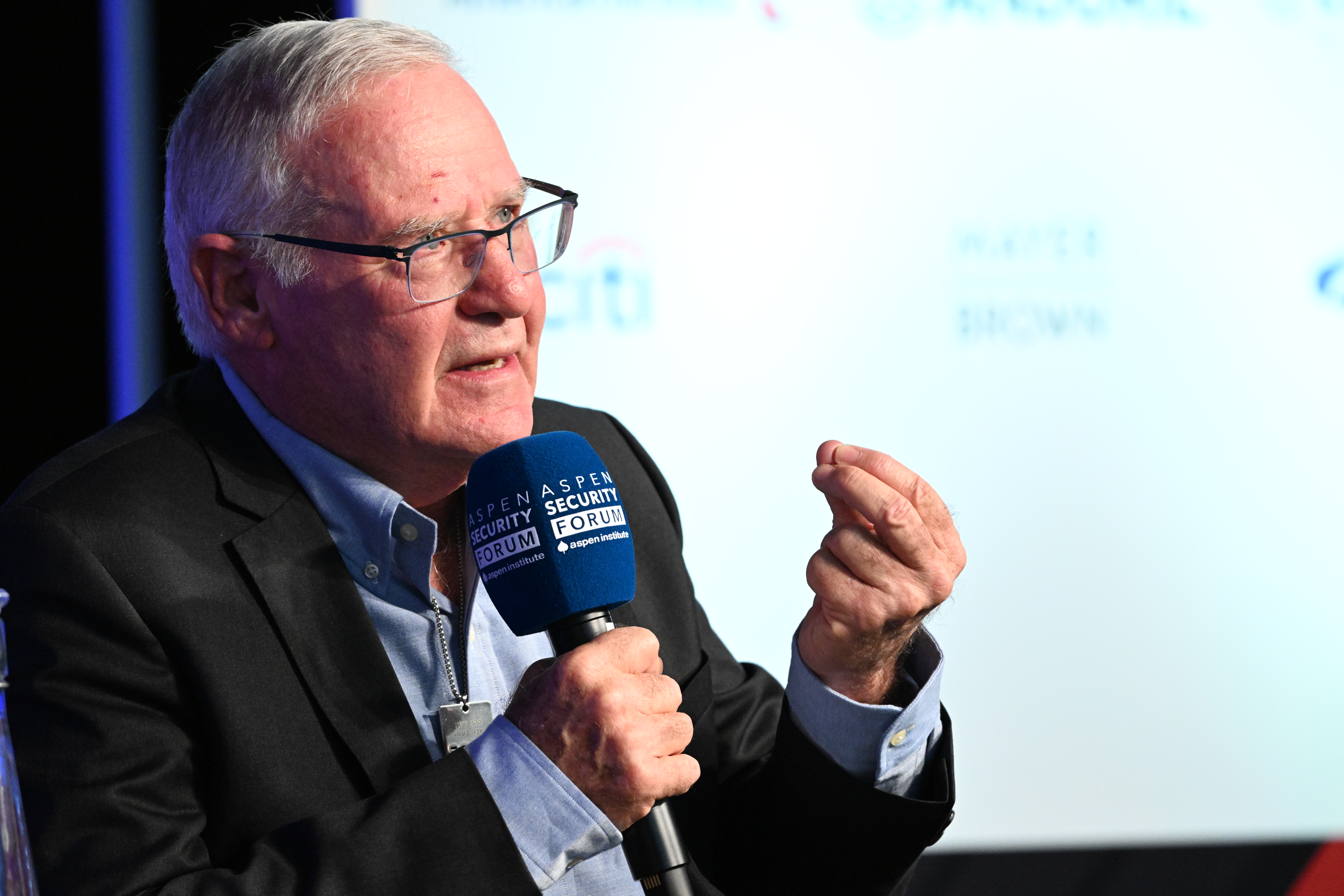Israel must “redefine the goals of the war,” says former intelligence chief Amos Yadlin

Amos Yadlin, the former head of the Israel Defense Forces’ military intelligence directorate, said Thursday at the Aspen Security Forum that Israel must redefine the “objectives of the war” in the Gaza Strip against Hamas, while sharply criticizing Israeli Prime Minister Benjamin Netanyahu.
Yadlin argued that it was impossible for Israel to kill every Hamas terrorist and proposed three goals for the war: the release of the hostages, the return to and reconstruction of communities in southern Israel, and ensuring that Hamas could no longer pose a threat to Israel.
He said these goals could be achieved in part through the current ceasefire agreement, which would allow Israel to withdraw from Gaza and possibly lead to a normalization of relations with Saudi Arabia and a strengthened coalition against Iran.
“This can be a strategic victory for Israel, instead of dreaming of an absolute victory, which unfortunately my prime minister wants to sell to his people,” Yadlin said. “Now is the time to say enough is enough with Gaza and bring these people back. This is important for our national unity and sense of security, and we begin to solve the strategic problem that this war has created.”
Yadlin said Hamas had already degraded to the point where it was operating only at the level of an insurgent, rather than as a full-fledged army as it did on October 7. And he said the mastermind of the October 7 terrorist attacks, Yahya Sinwar, was under enormous pressure from Hamas commanders to end the war.
He argued that Gaza’s post-war status and the deradicalization of its population – eliminating Hamas’ ideology – was “not our job” and “we cannot do that.” In the past, he has advocated for a Palestinian bureaucracy – not run by the current Palestinian Authority but backed by Egypt, Saudi Arabia and the United Arab Emirates – to take over the enclave.
“If there is a hostage release and there is a ceasefire in the south – which is also important for the innocent people in Gaza who don’t care about Sinwar, but I don’t, and who deserve a ceasefire – then there will be a ceasefire in the north too,” he added.
He said Israel should remain in the Philadelphia Corridor between Gaza and Egypt until the US, Egypt and Israel can agree on a plan to ensure that smuggling into Gaza cannot resume.
“And as long as the issue of demilitarization is resolved, say, through a partnership with the Egyptians – we can build an underground wall … we don’t need to be in Philadelphia,” he said. “But that cooperation and that plan should be agreed before we withdraw to make sure Hamas doesn’t rebuild.”
Yadlin said the October 7 attack was the result of failures by Israeli intelligence in providing early warning, operational errors by Israel’s Southern Command in responding to the attack, and political errors by Netanyahu.
“I never thought such a failure could happen,” Yadlin said. “I was head of intelligence 14 years ago, and since then the intelligence service has gotten even better.”
He accused Netanyahu of refusing to negotiate with reformers in the Palestinian Authority and allowing Qatar-backed Hamas to expand its capacity in the Gaza Strip. Netanyahu “did not want to take a political path and preferred the terrorists in the Gaza Strip,” he said.
Yadlin further criticized Netanyahu, saying the Israeli president would have had a chance to cement his legacy as one of the most successful and influential politicians in Israel’s history had he resigned in 2019, but because of the actions he and his coalition have taken since returning to office in 2022, he will now “go down in history as one of Israel’s worst prime ministers.”
Now, Yadlin said, Netanyahu’s best chance to save his legacy is to end the war and reach a normalization agreement with Saudi Arabia. He said the Israeli opposition would provide the votes needed for a deal if he promised to hold new elections.
The former head of Israel’s intelligence service warned that Iran is already close to possessing a nuclear weapon because it has enough fissile material for eight or nine bombs and the missiles to drop them.
Yadlin recommended focusing on Iran’s progress in weapons production as the third key component of a nuclear attack. And he said Israeli intelligence’s top priority should be to find out whether Iran’s supreme leader has decided to pursue a bomb after the failed Iranian missile attack on Israel in April.
Yadlin said the US and Israel should focus on reaching an agreement together on how they will stop Iran from building a bomb, where their “red lines” are regarding Iran’s nuclear program and what operational strategy they would pursue if that happened.
“Be prepared,” Yadlin said. “Because I am concerned that, given what is happening on the world stage – with Russia and China behind them – which was not the case ten years ago – Iran could detonate the bomb.”
Yadlin also strongly contradicted the statement by the previous panelist, former Palestinian Authority Prime Minister Salam Fayyad, that Israel was responsible for the failure of the Oslo peace process.
Yadlin responded that the PLO was responsible for violating the agreements because it supported the Second Intifada in 2000.
And he added that Fayyad’s proposal to admit Hamas into the PLO was unwise unless Hamas agreed to the internationally agreed principles for the PLO, which include recognizing Israel, renouncing terrorism and supporting the Israel-PLO agreement.
At the same time, Yadlin described himself as optimistic about the possibilities for peace, saying he and Fayyad probably agree on 90 percent of the points needed to resolve the conflict. However, Fayyad is not currently negotiating on behalf of the Palestinians, who, he noted, largely support Hamas and its October 7 attack.
Yadlin said he was still confident that “this terrible war will lead to peace” because the Yom Kippur War ultimately led to peace with Egypt.
“Five years later, (Egyptian leader Anwar) Sadat came to Jerusalem and said: no more war, no more bloodshed,” he said. “So in five years I’m waiting for an Israeli Sadat, a Palestinian Sadat.”


:max_bytes(150000):strip_icc():focal(735x255:737x257)/travis-kelce-taylor-swift-070524-c5ccd2aa39714c70a959486e559b49ed.jpg)
